The young apprentices and a design for a working life
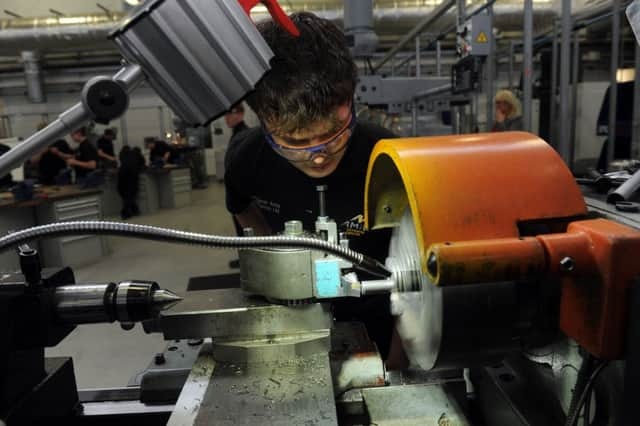

“Factory of the Future” – so the sign boldly proclaims, and looking at the array of smart, steel and glass edifices emblazoned with prestigious names like ‘Boeing’ and ‘Rolls Royce’ it’s hard to disagree.
The University of Sheffield’s Advanced Manufacturing Research Centre (AMRC) was set up 16 years ago to combine the city’s industrial expertise with new engineering research. Since then it has grown to include more than 90 partners and was further boosted by Boeing’s recent decision to base its first European factory here.
Advertisement
Hide AdAdvertisement
Hide AdThe fact this sprawling manufacturing research park is housed on the site of the former Orgreave Colliery, such a potent symbol of an industrial past that has all but vanished, is a pertinent one.
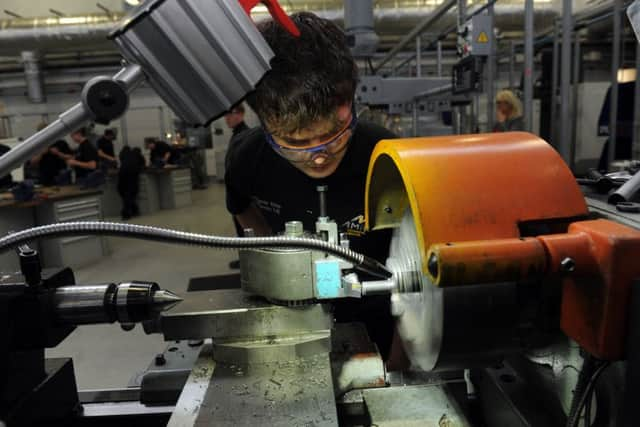

Much has been made of the failure of successive governments to properly stimulate investment in former mining towns and those where traditional manufacturing industries, once the bedrock of so many local communities, have withered and died.
So to have such a cutting-edge research and development complex here has been a boon to the local area.
The neighbouring AMRC Training Centre is no less important and since opening just over three years ago, the centre has trained nearly 800 apprentices working for engineering and manufacturing firms based in the region.
Advertisement
Hide AdAdvertisement
Hide AdIt runs advanced apprenticeships ranging from machining and welding to robot maintenance, as well as degree apprenticeships, and they work closely with employers to ensure the apprentices (everyone who comes here has a job) are getting the practical training and experience they need.
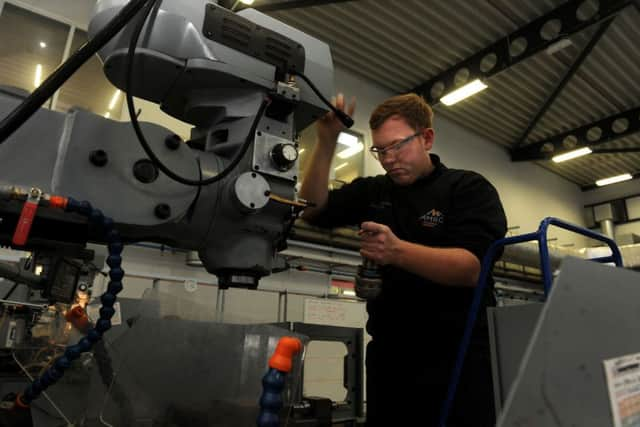

Kerry Featherstone, the training centre’s director, says around two-thirds of the apprentices are aged between 16 and 18 and work for a wide variety of firms.
“They range from local employers that might have five people working for them right up to companies like Rolls Royce.”
The fact there’s such growing interest in apprenticeships shows just how far attitudes have changed. Even just a decade ago they were sniffily seen as the poor relation next to university degrees, but now they are increasingly being recognised as a mark of excellence with businesses, big and small, queueing up to take on apprentices.
Advertisement
Hide AdAdvertisement
Hide AdThe Government has jumped on the bandwagon setting a target of three million apprenticeships by 2020 which is good news for training centres like this.
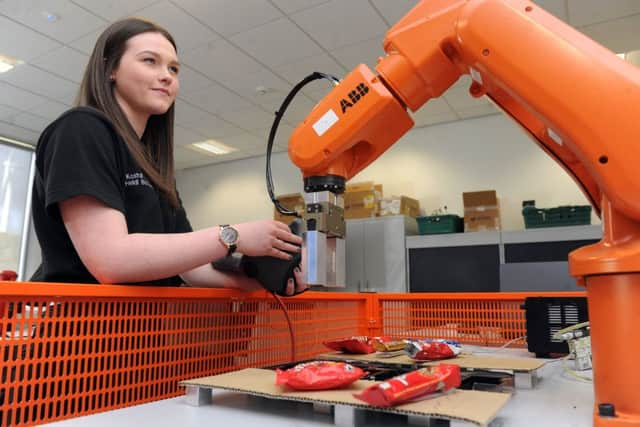

“The perception has changed, we are hearing more about things like degree apprenticeships and this is getting out to young people and parents. Schools are talking about them more as an option whereas in the past they wanted pupils to go on to university,” says Featherstone.
However, one area of concern is the lack of female apprentices in the UK, especially in engineering, which was highlighted in a report by the Young Women’s Trust last year.
At the AMRC training centre there’s just four female apprentices, something Featherstone wants to change. “We’d love to get more women into engineering but it’s going to take time to change the perception though we are starting to see more slowly coming through, and that’s positive because it means we are having an impact.
Advertisement
Hide AdAdvertisement
Hide Ad“At the moment the girls that come into engineering often have family connections and we need to break down those barriers and get the message out there to a wider audience.”
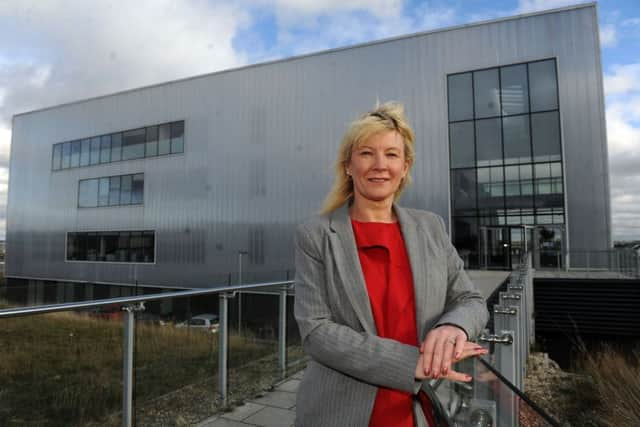

Heidi Butterfield, from Wakefield, is one of the female apprentices training here. The 19- year-old is following in the footsteps of her father who started out as an apprentice. “In school there wasn’t much opportunity to get into engineering, especially for girls, but it was something I was interested in,” she says.
Heidi’s spending six months at the centre as a technical support apprentice before returning to her job with manufacturing firm Kostal UK. “What we’re doing is very much about the future of technology. There’ll always be a need for machining and welding but in years to come it will be more about robotics and 3D printing and for us it’s exciting,” she says.
Katy Foster, 16, is also a technical support apprentice and has a job with Sheffield-based machine manufacturers DavyMarkham.
Advertisement
Hide AdAdvertisement
Hide Ad“I wanted to do something that was hands-on but apprenticeships weren’t really talked about as an option at school. It was only because my form tutor was an ex-engineer herself and she encouraged me to come here,” Katy explains.
“When we get school visits we tell the girls that it’s fun and there’s as much opportunity, if not more, as there is for the lads. I think the more schools come here and the more pupils know about the place, the more young people are likely to want to be an engineer.”
Many of the apprentices, like 18- year-old Ben Kaye, have some family connection. “My granddad used to be a patternmaker so I’ve always been around engineering and as a kid I loved getting Meccano sets,” he says.


Ben, from Sheffield, is a manufacturing apprentice and says he opted to come here rather than going to university. “I did engineering at college and I wanted to go to uni but the money aspect and the amount of debt put me off that.
Advertisement
Hide AdAdvertisement
Hide Ad“I want to earn money as well as learn. My goal is go to uni but later in life. I want to use engineering to travel and see places around the world because the skills you learn here are transferable wherever you go.”
He disagrees with those who say that apprenticeships are an easy option. “It’s different to a college, it’s a workplace. You’re getting paid while you’re here so you need to be on time. You can have a bit of banter but you’ve also got to get on with your work,” he says.
“At school if you got stuck with something the teacher would help you or give you a textbook. But here if you say to a trainer ‘what am I doing wrong?’ They’ll make you work it out for yourself, which is good because that way you learn how to fix things.”
At 23, Kieran Bartholomew is a bit older than most of the other apprentices. “I didn’t really know what I wanted to do when I was at school and after I left I did a couple of rubbish jobs in supermarkets and call centres to pay my way. But I knuckled down and came here and I’m finally doing something I want to do.”
Advertisement
Hide AdAdvertisement
Hide AdKieran, from Rotherham, works for a Hoyland-based firm and believes apprenticeships can give you an edge when it comes to getting a job.
“At college they teach you how to be good at a certain job, whereas here you learn how to be good at that job but you also learn how to behave in a workplace environment and the work ethic you need to be successful – so you get the best of both worlds.”
Spotlight on apprenticeships
It’s National Apprenticeship Week (March 6-10) and a chance to put the spotlight on apprentices working in a range of different industries.
But it’s also raises questions about apprenticeships themselves. The Government has set a target of three million apprenticeships by 2020 and is introducing a levy, due to come into force in April, on employers to fund it.
Advertisement
Hide AdAdvertisement
Hide AdMost experts agree that there is a need for better vocational training in this country – and the Government’s industrial strategy has emphasised the need to improve technical education.
However, in a report published earlier this year, the Institute for Fiscal Studies questioned how much extra earnings could be generated by the proposed investment in apprentices.